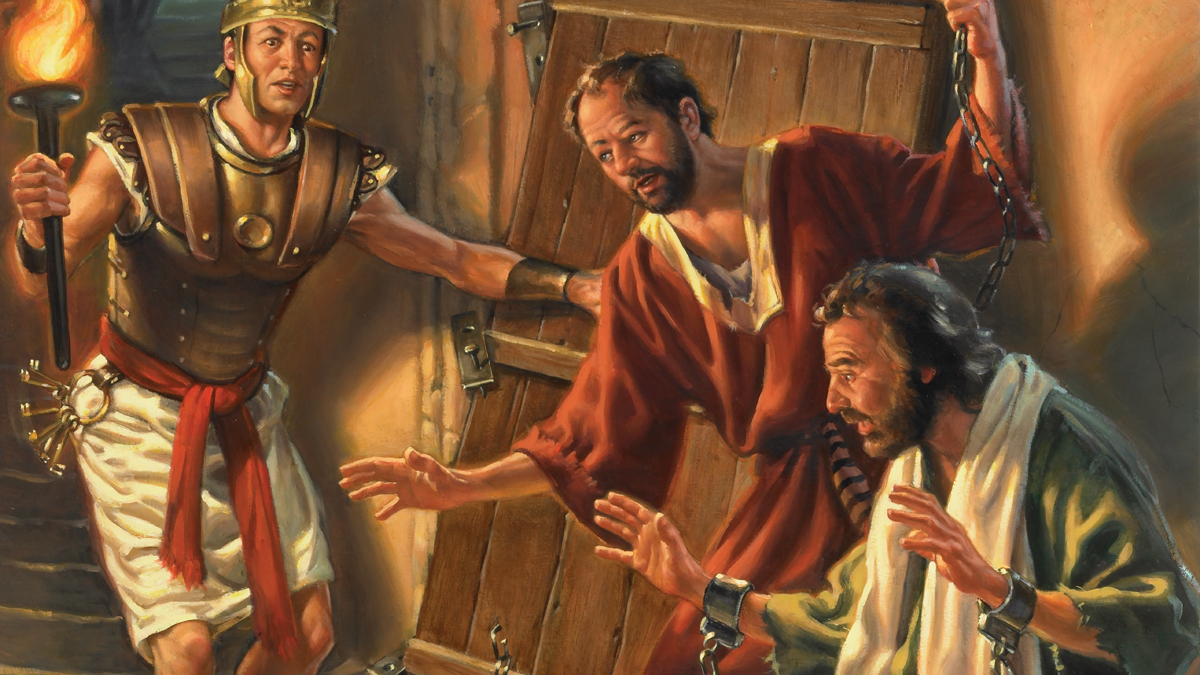The text for this lesson is Acts 16:16–34
Key Point
- Through the witness of Paul and Silas to the Philippian jailer and his family, the kingdom of God grew. We ask that God help us live according to His Word and use us to extend His kingdom of grace.
- Law: Satan and my sinful flesh do not want to hallow God’s name or let His kingdom come.
- Gospel: Through water and the Word, God gives me His Holy Spirit so that I believe His Word, live as a member of His kingdom of grace, and use my gifts to share His love in Jesus, extending His kingdom.
Context
- Paul’s first missionary journey is recorded in Acts 13–14. He traveled with Barnabas into Asia Minor, but then felt compelled to return to Jerusalem for a council (AD 49) to discuss the relationship of Old Testament laws to the new Christian Church (Acts 15:1–35). After this council, he and Silas started from Antioch on the second missionary journey, going as far as Greece (Acts 15:36–18:22). On this journey, they revisited places from Paul’s first trip until the Holy Spirit directed them on to Macedonia (16:6–10). There, Paul and Silas had an extensive stay in Philippi. While some received and believed their message, many were threatened by it. Some beat them and even threw them in jail.
Commentary
Paul and Silas were in the custom of visiting Jewish or Roman holy places and places of prayer in order to engage people with the Gospel of Jesus. They were going to such a place when a demon-possessed girl was crying out in public about their mission. She was proclaiming the truth about them that they were “servants of the Most High God” sent to proclaim the “way of salvation” (16:17). She did this day after day, and at first, Paul allowed it to happen. But after it became a nuisance, Paul cast out the spirit. This upset her owners because they earned money by her fortune-telling.
She was possessed not with the Holy Spirit, but rather with an evil spirit. Her owners were not faithful to Jesus, but rather made money from her predictions. Her owners accused Paul and Silas of offending Roman customs and laws. Paul and Silas were beaten with rods and thrown in jail. The jailer was ordered to keep them secure, so he placed them in the inner cells of the jail and bound them with chains.
Their faith was not dampened, and they relied on God’s promises during this persecution; they were praying to God and singing hymns. The other prisoners were listening to them. About midnight, God released their chains and the chains of all the prisoners. He opened the doors to the cells, but no prisoner escaped. Perhaps the other prisoners were influenced by Paul’s prayers and hymns along with the miraculous release of bonds.
When the jailer saw all the doors open, he assumed the prisoners had escaped. He knew that the penalty for this dereliction was death, so he decided to take his own life instead of waiting for the death sentence from his commander. But Paul stopped him. The jailer immediately knew who was responsible for the miraculous release and the fact that no one escaped. His reaction is one of repentance. He wants to be saved. He wants the faith that has such confidence in the face of trials and tribulations.
Paul and Silas had witnessed to the inmates and the jailer by their prayers and hymns in the face of trials and their patience in the midst of persecution.
After the jailer’s confession of Christ, Paul and Silas baptized him and his entire family.
God causes His kingdom to grow in the most unusual earthly circumstances. By all outward indications, it was a bleak situation that looked hopeless for Paul and Silas. But the Lord turned it into an opportunity to expand His kingdom. He worked through Paul and Silas to bring the jailer and his household to faith.
The Holy Spirit is at work in prayers, in hymns, in Scripture, and in Baptism. He converts the heart to trust in God by grace and grants the ability to live godly lives here in this world and in heaven for eternity.







